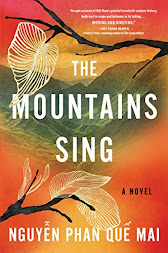This was subject matter that, on the intellectual level, alerted the interest of all of us, and Clare, introducing the book, declared her appreciation of the fact that the book addresses a viewpoint and experience that has so far had little attention in accounts of this history, a point with which we all agreed. However, although she appreciated the lyrical descriptions, she found the narration plodding, and therefore not in fact all that engaging. We all felt the same. In fact, I didn't find the descriptive passages as lyrical as Clare did, but rather cliched and clumsy and thus alienating rather than engaging. All felt that the characters were hard to engage with as they never came to life. As Ann pointed out, they were ciphers, each created to illustrate a particular aspect of Vietnamese history. Someone also commented that the book was sentimental.
It was clear to us that it had been a dynamic political choice to write the book in English, as those who need most to hear its message are Americans and the West. We felt it a shame therefore that because of this lack of emotional involvement with the characters, we engaged only intellectually with the message, since the real potential political power of fiction is in its ability to make readers identify with a message on an emotional level. Mark - who wasn't at the meeting - also pointed out later that it was sometimes hard in any case to grasp the history, since there was no differentiation between the two alternating voices, and sometimes he got muddled about what had happened when. It was also his cynical view that the book's huge success is down to American guilt about Vietnam, a guilt which indeed preceded its publication, and thus paved the way for its reception.
Our archive discussions can be found here and a list of the books we have discussed, with links to the discussions, here













No comments:
Post a Comment